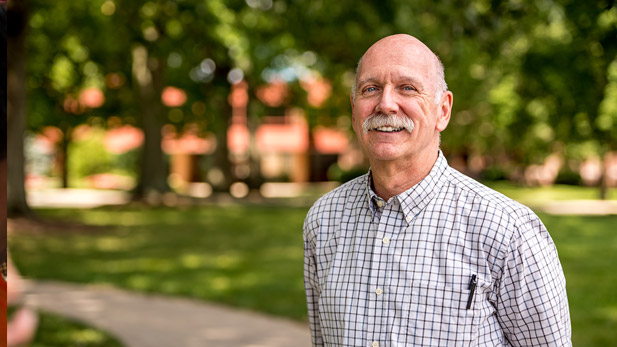Professor Helps Draft U.S. Government’s Five-Year STEM Education Plan
Friday, December 07, 2018

As a State Department STEM fellow, professor of electrical and computer engineering Daniel J. Moore is a member of the subcommittee reviewing federal coordination in STEM education.
Electrical and computer engineering professor Daniel J. Moore is helping the federal Office of Science and Technology Policy recommend education policy and goals for the next five years that will help America win the global competition for science, technology, engineering and mathematics talent.
As a State Department STEM fellow for this school year, Moore is a member of the subcommittee reviewing federal coordination in STEM education.
The subcommittee played a key role in the National Science and Technology Council’s report, America’s Strategy for STEM Education, released Tuesday, that charts a course for success through America’s strategy for STEM education. Important issues are improving STEM literacy, increasing diversity and inclusion, and preparing the STEM workforce to meet future challenges by developing partnerships between schools and local businesses.
In a white paper accompanying release of the report, the Office of Science and Technology Policy called improving STEM education a national imperative. It states that “America’s Strategy for STEM Education charts a course for success, and the federal government stands ready to join with the national education community. Together, we will ensure that all Americans have lifelong access to high-quality STEM education and the United States is the global leader in STEM literacy, innovation and employment.”
Moore adds, “It is important to understand that a STEM knowledgeable citizenry, not just the technical workforce, is recognized as essential for continued U.S. growth, and that departments and agencies across the U.S. government are making strong commitments to invest in the plan.”
Moore’s experience as a 22-year member of the Rose-Hulman faculty and a variety of international educational opportunities were considered helpful as subcommittee members crafted parts of the STEM education policy plan. He became involved in the group’s work in the first week in Washington, D.C, as an adviser to State Department officials about global STEM issues.
Moore proposed and marked changes in the final six drafts of the plan, and he will be part of the implementation plan writing committee which will spend early 2019 providing details of how the goals will be addressed and accomplishments evaluated. He also will work with a variety of agencies to provide guidance on STEM educational curriculum, classroom materials and learning activities.
A long list of STEM-related activities is keeping Moore busy since beginning his one-year term in July as a government fellow through the Institute of Electrical and Electronic Engineers. He was involved in a Global Innovation through Science and Technology workshop and a Women in STEM program as part of an international meeting in Brisbane, Australia. He will be involved in several events, focused on international partner countries, which are focused on increasing underserved groups within the STEM community.
As a State Department STEM fellow for this school year, Moore is a member of the subcommittee reviewing federal coordination in STEM education.
The subcommittee played a key role in the National Science and Technology Council’s report, America’s Strategy for STEM Education, released Tuesday, that charts a course for success through America’s strategy for STEM education. Important issues are improving STEM literacy, increasing diversity and inclusion, and preparing the STEM workforce to meet future challenges by developing partnerships between schools and local businesses.
In a white paper accompanying release of the report, the Office of Science and Technology Policy called improving STEM education a national imperative. It states that “America’s Strategy for STEM Education charts a course for success, and the federal government stands ready to join with the national education community. Together, we will ensure that all Americans have lifelong access to high-quality STEM education and the United States is the global leader in STEM literacy, innovation and employment.”
Moore adds, “It is important to understand that a STEM knowledgeable citizenry, not just the technical workforce, is recognized as essential for continued U.S. growth, and that departments and agencies across the U.S. government are making strong commitments to invest in the plan.”
Moore’s experience as a 22-year member of the Rose-Hulman faculty and a variety of international educational opportunities were considered helpful as subcommittee members crafted parts of the STEM education policy plan. He became involved in the group’s work in the first week in Washington, D.C, as an adviser to State Department officials about global STEM issues.
Moore proposed and marked changes in the final six drafts of the plan, and he will be part of the implementation plan writing committee which will spend early 2019 providing details of how the goals will be addressed and accomplishments evaluated. He also will work with a variety of agencies to provide guidance on STEM educational curriculum, classroom materials and learning activities.
A long list of STEM-related activities is keeping Moore busy since beginning his one-year term in July as a government fellow through the Institute of Electrical and Electronic Engineers. He was involved in a Global Innovation through Science and Technology workshop and a Women in STEM program as part of an international meeting in Brisbane, Australia. He will be involved in several events, focused on international partner countries, which are focused on increasing underserved groups within the STEM community.